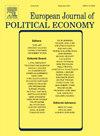Assessing the efficacy of China's anti-corruption drive: Insights from consumer expenditure patterns
IF 2.4
3区 经济学
Q2 ECONOMICS
引用次数: 0
Abstract
This paper examines the economic impact of China's President Xi Jinping's Eight Regulations of Austerity and the coordinated anti-corruption campaign. Specifically, I analyze the effects of this campaign on household expenditure patterns in China using a triple differences approach. I compare the expenditures of households with government employees to those without, both before and after the anti-corruption reform, across commodities likely to be subject to corruption versus those unlikely to be affected. The findings demonstrate that, in the post-reform period, government-affiliated families allocate relatively more expenditure towards goods they likely obtained illegally through bribes previously. Conversely, expenditure patterns for goods less susceptible to corruption do not show a relative increase in the post-reform period. These expenditure shifts are most pronounced among families of low-level officials, with the majority of the increase observed among non-Chinese Communist Party member government employees and those outside Xi Jinping's power base. This suggests that individuals with the strongest party ties were able to circumvent the effects of the anti-corruption campaign.
评估中国反腐运动的效果:来自消费者支出模式的洞察
具体而言,我使用三重差异方法分析了这一运动对中国家庭支出模式的影响。我比较了反腐改革前后有政府雇员的家庭和没有政府雇员的家庭的支出,包括可能受到腐败影响的商品和不太可能受到腐败影响的商品。研究结果表明,在改革后时期,政府附属家庭将相对更多的支出用于他们以前可能通过贿赂非法获得的商品。相反,不易受腐败影响的商品的支出模式在改革后期间没有显示出相对增加。这表明,与政党关系最密切的个人能够规避反腐运动的影响。
本文章由计算机程序翻译,如有差异,请以英文原文为准。
求助全文
约1分钟内获得全文
求助全文
来源期刊

European Journal of Political Economy
Multiple-
CiteScore
3.40
自引率
10.00%
发文量
106
期刊介绍:
The aim of the European Journal of Political Economy is to disseminate original theoretical and empirical research on economic phenomena within a scope that encompasses collective decision making, political behavior, and the role of institutions. Contributions are invited from the international community of researchers. Manuscripts must be published in English. Starting 2008, the European Journal of Political Economy is indexed in the Social Sciences Citation Index published by Thomson Scientific (formerly ISI).
 求助内容:
求助内容: 应助结果提醒方式:
应助结果提醒方式:


